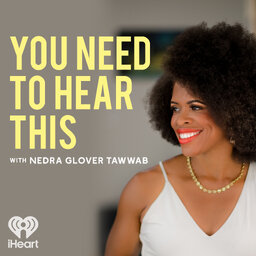Retire Anxious Habits w/ Dr. Jud Brewer
This week Nedra has an in depth conversation with psychiatrist and author, Dr. Jud Brewer. The two dive into anxiety, how anxious habits can affect the basic functions of our lives such as eating and sleep, and what we can do to start to take back some control.
In 1 playlist(s)
You Need to Hear This with Nedra Tawwab
New York Times best-selling author, relationship expert, and licensed therapist Nedra Glover Tawwab …Social links
Follow podcast
Recent clips

Support Those In Dangerous Situations
16:56

Un-Blur the Line Between Your Business and Mine
24:11

Declare There Is No Bottom
36:20
 You Need to Hear This with Nedra Tawwab
You Need to Hear This with Nedra Tawwab